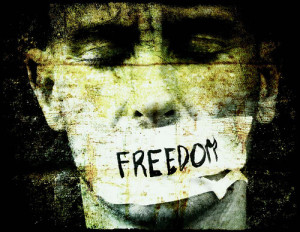 SC/ST Act curbs free speech: HRW Really ?
SC/ST Act curbs free speech: HRW Really ?
Sedition law finds a spot in Human Rights Watch‘s list of Indian legislations that ‘restrict freedom of expression’.
The global human rights watchdog Human Rights Watch (HRW), in its 2016 report on India titled ‘Stifling Dissent: The Criminalisation of Dissent in India,’ presents a list of draconian Indian laws that “restrict freedom of expression”.
Alongside laws like section 124 A (the sedition law), and section 295 A (hurting of religious sentiments) of the IPC, which are predictable inclusions, also in the list are the Scheduled Castes and Scheduled Tribes (Prevention of Atrocities) Act, 1989, and its amendment, the SC and ST (Prevention of Atrocities) Act, 2015.
While noting that SC/ST Prevention Act is “one of the most important pieces of legislation for the protection of Dalits”, the report singles out section 3 (1) (x) of the Act as a provision ripe for misuse. This section penalises anyone who “intentionally insults or intimidates with intent to humiliate a member of a Scheduled Caste or a Scheduled Tribe in any place within public view.”
The report highlights the case of sociologist Ashis Nandy as illustrative of “how this well intentioned law could be misused. In January 2013, at the Jaipur Literature Festival, Nandy had allegedly made a comment about Dalits being among the “most corrupt”. Nandy apologised but he was still booked under section 3 (1) (x) of the SC/ST Prevention Act.
‘Vague language’
The HRW, referring to an earlier report by PEN International, concludes that “the vague and overbroad language of the act, which targets humiliating rather than hateful speech, makes it ripe for abuse.” In its recommendations to the Indian Parliament, it suggests amending section 3 (1) of the SC/ST Prevention Act to “bring it in line with ICCPR [International Covenant on Civil and Political Rights] article 20 by allowing for restriction of speech only when it constitutes incitement to discrimination, hostility, or violence.”
Mr Nandy, when contacted by The Hindu, endorsed the HRW report’s argument. “I am not a lawyer and I cannot tell you how to amend it,” he said. “But if you want to prevent people from being blackmailed by this provision of the SC/ST Act, as I have been, it must be revised to remove all possibilities of misuse.”
Dalit rights activist and general secretary of National Dalit Movement for Justice, Mr Ramesh Nathan, however, criticised the HRW report. “What is their motive in bringing up Mr Nandy’s case?” he said. “Section 3 (1) (x) was included after extensive consultations with constitutional experts. Just because it can be misused by some politicians, as happened with Mr Nandy, doesn’t mean it has to be amended. There are many Indian laws that are misused every day. We don’t ask for all of them to be amended.”
Human rights lawyer Colin Gonsalves agrees. “We have to ask whether this law is constitutionally sound. If the answer is yes, as it is in this case, there is no case for revising it. Next comes whether it can be misused. Legally speaking, it is irrelevant whether it is being misused, for that is what you have courts for.”
‘HRW mistaken’
The core argument HRW makes against the SC/ST Atrocities Act, however, is that disrespectful speech or words that promote “negative feelings, however offensive, is not the same as incitement to acts of hostility, discrimination, or violence, and as such should not be subject to criminal penalty.”
Gonsalves avers that HRW is completely mistaken in its evaluation of section 3 (1) (x) of the SC-ST (Prevention of Atrocities) Act as curbing free speech.
“This is a very profound pro-Dalit provision precisely because it takes cognisance of the close link between caste insults and violence. That is why it does not ask for separate proof of incitement to violence. Even today, in schools, Dalit kids are called by derogatory caste names and caste insults are frequently precursors to violence,” he said. “The Ashis Nandy case may or may not fall within the purview of this provision but you cannot make a case for revising a law based on one case involving a celebrity. This is a very shallow analysis by HRW and I am surprised by it.”
But can we disregard the UN guidelines on what constitutes hate speech?
“Did the UN take into account the caste realities in India while framing those guidelines?” counters Gonsalves. “India can take a different tack from the UN and in the caste context that is specific to India, it makes perfect sense to depart from the global norm and classify humiliating or disrespectful speech as hate speech.”
Adds Mr Nathan, “The issue is not whether SC/ST Prevention Act is being misused. The real issue is whether police are registering cases under SC/ST Prevention Act, whether the prosecutions are taken seriously, and whether the conviction rates under this law are improving.” According to NCRB data, 2014 witnessed a 19.4% increase in crimes against SCs over the previous year, with a total of 40,300 cases registered under the SC/ST Prevention Act.
http://www.thehindu.com/news/cities/Delhi/scst-act-curbs-free-speech-hrw/article9070826.ece
 SC/ST Act curbs free speech: HRW Really ?
SC/ST Act curbs free speech: HRW Really ?
September 5, 2016 at 9:12 am
It is not a question of amendment to law but the implementation of human rights policy. Dalits are segregated and discriminated. Upper-caste are more corrupt since they hold instruments of production. Nandy’s case is a one-time case and he even apologised. The fact is under-privileged castes are exploited and they are maligned even for slight deviations from ordinary course of business.